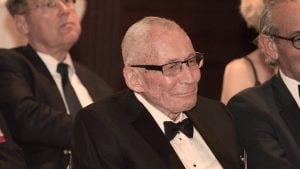For Civil Society to Do More, Political Society Must Do Less
Mr. Bandow, a nationally syndicated columnist, is a senior fellow at the Cato Institute and the author and editor of several books, including Tripwire: Korea and U.S. Foreign Policy in a Changed World.
As the Age of Politics (historian Paul Johnson’s label for the twentieth century) winds down, even liberals are championing civil society. Herds of politicians now say that families and communities, not governments, hold the answer to America’s social problems. At the very least, they advocate private-public partnerships, rather than grand new government social programs.
To promote such service the Summit for America’s Future convened in April. Representatives from volunteer organizations, businesses, and churches, along with local governments and Indian tribes, gathered in Philadelphia to, in the words of the sponsors, mobilize millions of citizens and thousands of organizations from all sectors of society in order to ensure that every young American has access to resources considered essential for achieving healthy, fulfilling and productive lives. In response companies promised money, services, and products to nonprofit enterprises.
Enlisting civil society to help mentor and tutor at-risk youth, improve health care, support families, assist elder-care and more is obviously a good thing. As long as it is truly voluntary. The distinction is important, since the government has a way of making involuntary the supposedly voluntary. For instance, the state of Maryland and a number of local school districts require students to volunteer in order to receive a diploma from high school. Some Summit attendees, led by the President, supported this attempt to make compassion compulsory, the worst sort of oxymoron imaginable. It makes a mockery of the Summit’s very premise.
Similarly, proposals abound to use the tax law to bludgeon business into doing what government considers to be responsible behavior. Some advocates of this approach would add voluntarism to their indicia of corporate responsibility. But philanthropy motivated by such threats would be extortion, not voluntarism.
Even truly voluntary contributions are viewed by many firms more as a tool of public relations than an exercise of moral responsibility. However, that doesn’t diminish the good that can be done by business. Companies have an enormous capacity to aid those around them.
Nevertheless, encouraging firms to voluntarily drop a few dollars on the less fortunate should not blind us to the most important issue. Government stands in the way of helping the needy at almost every turn.
Business performs its most important service to the poor by doing what it is constituted to do: employ people and provide goods and services. To the extent that it does so successfully, it will reduce the incidence of poverty and alleviate attendant social problems. Moreover, as business succeeds, it generates wealth for others—workers in related industries, pensioners, and more.
Not that politicians ever understand. Observes T.J. Rodgers, president and CEO of Cypress Semiconductor, over the last two decades government meddling [has] metastasized to the point that business can no longer provide workers with ever-higher wages. No one gains when the state grows in this way. Notes Rodgers, subordinating shareholder value to ‘social responsibility’ invariably cheats both shareholders and society at large.
Government meddling most hurts those low-cost, labor-intensive enterprises which provide employment and services to poor communities. The minimum wage puts unskilled employees out of work. Local public transportation monopolies forbid inexpensive jitneys that enable lower-income people to find and hold jobs. Burdensome zoning requirements and building codes, special-interest licensing laws, and other regulations impede the development of small businesses that are critical for lifting people out of poverty through work.
Thus, political leaders concerned about the disadvantaged should eliminate barriers to business doing what it does best. This isn’t enough, however. In many cases government is to blame for the problems in the first place. Before exhorting others to help, public officials should get their own policies right.
Consider education. Illiteracy is rife among inner-city kids, so volunteers are now supposed to teach students to read. But how about dealing with a public educational system that is turning out illiterates? The answer here is really not voluntarism, but privatization: parents should be able to choose among competitive educational alternatives, ensuring that their kids end up able not only to read, but to learn the values necessary to become responsible citizens in a free republic. Yet the politicians who speak loudest about helping the poor most strongly resist even any change in the public school monopoly.
People devoted to the poor also need to help shift the perception that responsibility for solving social problems lies with the state, and eliminate the barriers now created by government to individual, family, and community initiative. For most of America’s early history, people recognized that they had a moral (and religious) duty to care for those in need. As Marvin Olasky, author of The Tragedy of American Compassion, points out, compassion meant to suffer with. To fulfill one’s responsibilities as a citizen and a human being required involvement in the lives of others.
Since then, however, people have taken compassion to mean, first, writing a check, and more recently, making other people write checks. Indeed, in response to President Clinton’s call on every church to employ one person now on welfare, the Reverend Albert Pennybacker of the National Council of Churches argued that Our job is not to compensate for the failure of government to do its job.
But the Reverend Pennybacker has it all wrong. The Biblical model is clear: the able-bodied are to work and support themselves and their families; churches are to nurture, aid, and empower their members; finally, people of faith are to do good to all people (Gal. 6:10). The fundamental Christian duty is responsibility for themselves and charity to others. To the extent government has a role, it is as the ultimate safety net to catch those falling through multiple private ones. Political society should act only when civil society fails to do so.
Many people still do serve: nearly half of the adult population volunteers, spending an average of 4.2 hours a week in service activities. But the Reverend Pennybackers of the world have been willing to slough significant responsibility off on government, which, as the most imperialistic of institutions, has avidly filled the void. Thus, politicians serious about restoring civil society must say no more. Public officials would do more for voluntarism by emphasizing the primacy of private assistance and the moral responsibility of every human being for his or her needy neighbors than attending summits.
Equally important, policymakers should reform government policies that discourage voluntarism and impede community development. Mother Teresa’s religious order dropped a planned AIDS facility because New York City insisted that the building include a costly and unnecessary elevator. Labeling requirements in Los Angeles prevent restaurants from giving food away to the homeless. The federal government threatened to put Salvation Army rehabilitation centers out of business when it proposed applying the minimum wage law to participants.
Well-publicized volunteer programs are a staple of politics. A succession of presidents have undertaken one or more such initiatives. But, like the much ballyhooed Hands Across America more than a decade ago, none has had much impact.
Today’s Summit participants must reach deeper issues to ensure that the latest effort doesn’t go the same way. Rewarding the successful who throw alms to the poor is fine. But better would be lowering the barriers to success, helping those in need to help themselves. Public officials need to answer for the failings of their own policies. For civil society to do more, political society must do less.




